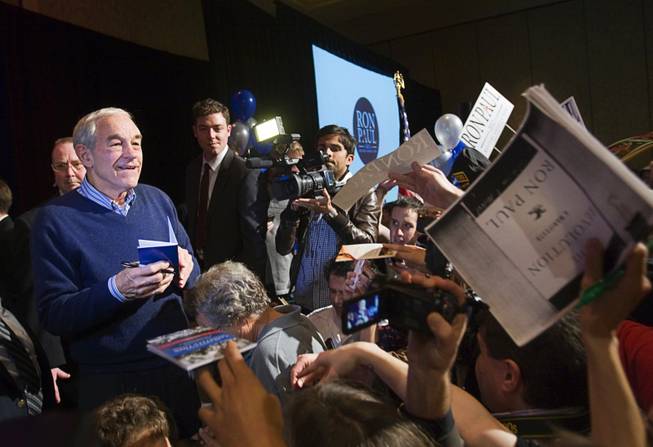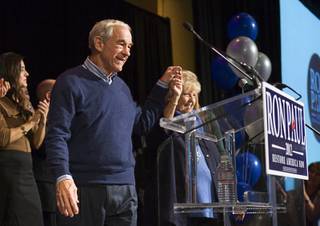
Republican presidential candidate Rep. Ron Paul, R-Texas, signs autographs after speaking at a rally at the Green Valley Ranch Resort in Henderson on Tuesday, Jan. 31, 2012.
Friday, Feb. 3, 2012 | 2 a.m.
Where's the Love?
Las Vegas is on top of gay tourism destinations. So why is Las Vegas Mayor Carolyn Goodman risking it all by refusing to sign on to a widely supported pledge for gay marriage? We'll hear from an activist. Plus, who has the best chance to win Nevada's Republican caucus? Can Sheldon Adelson's money help put New Gingrich over the top? Will Mitt Romney's Mormon faith make the difference as it did in 2008? Or will Mormons for Ron Paul chip away at the faithful. We'll ask some experts.
Presidential Candidate Ron Paul
Congressman Ron Paul is the only Republican presidential contender without a prary win. Might he find Lady Luck in Nevada? We ask him tonight in an exclusive interview.
Related stories
Sun coverage
The idea of a divided Mormon vote in Saturday’s Republican presidential caucus sounds implausible: Mitt Romney is positioned to become the first major-party presidential candidate who is also a member of the Church of Jesus Christ of Latter-day Saints.
But Ron Paul’s campaign isn’t automatically ceding that ground, and instead has mounted a campaign aimed at members of the church based on Paul’s strict constitutionalist views.
The Paul campaign has been touting “Latter-day Saints for Ron Paul,” in addition to other groups. And while best Paul can realistically hope for is a second-place finish among Mormon voters — and likely overall — the effort targets a potentially sympathetic group.
Little noted by those outside the faith, the U.S. Constitution is revered by Mormons as a divinely inspired document, a fact that plays nicely into Paul’s argument that his positions abide by the intent of the Constitution. That argument is the focal point of the Paul campaign’s effort to peel away Mormon voters from Romney.
Paul “is the only candidate who seems to reference the Constitution in any way,” said Aaron Anderson, 27, a Las Vegas Realtor who is a Mormon and Paul supporter. “We believe the freedoms and liberty given in the Constitution are divinely inspired. It definitely plays an important role.”
Floyd Fitzgibbons, 54, of Las Vegas, said, “I believe the Constitution is an inspired document. There’s one candidate who speaks to that issue — Ron Paul never votes on any bill that does not adhere to the Constitution.”
Much has been made during the campaign about this being a breakthrough moment for the faith. The church has emphasized that it does not endorse candidates or political parties. (Religions must be neutral to maintain their federal tax-exempt status.)
The church has 175,000 members in Nevada, less than 6 percent of the population. But exit polls show Mormons made up 25 percent of Republican caucusgoers in 2008, when Romney won Nevada with 51 percent of the vote. Nine out of 10 Mormons who caucused said they supported Romney.
Coming off its strong victory in Florida, Romney’s campaign said the former Massachusetts governor’s appeal is broad.
“We don’t have 100 percent of any group locked up,” said Ryan Erwin, a Nevada campaign consultant for Romney. “The great thing about Gov. Romney is that the breadth of his support is deep and large.”
The campaign is “focused on jobs and the economy,” Erwin said. But “part of that is reducing the size of government and getting back to basics. I do hear the governor talk about the founders, and getting back to basics.”
While its emphasis by church leaders has waxed and waned, Mormons believe the nation’s founders were inspired by God as they drafted the U.S. Constitution.
In a 1992 article for a church magazine, Elder Dallin H. Oaks, a member of the church’s governing Quorum of the Twelve and a former Utah Supreme Court justice, wrote: “I see divine inspiration in what (church leader) J. Reuben Clark called the ‘great fundamentals’ of the Constitution.”
Oaks made it clear that the Constitution is not infallible — he cited its original accommodations for slavery — and that the document could, and should, be changed in some ways.
Mormons do not study the Constitution like scripture, but “most probably know more about it than the average American churchgoer,” said Richard Ostling, co-author of “Mormon America” and a former journalist for Time magazine and the Associated Press. “The LDS church uniquely believes the U.S. Constitution was divinely inspired. Ron Paul is basing his candidacy on a libertarian interpretation of the Constitution. That will appeal to a certain segment of the Mormon community.”
To be sure, Paul’s Mormon supporters acknowledge that most of their fellow church members identify with Romney. Polls this week showed Romney with a big lead, including among Mormons.
“We’re playing for second (among Mormon voters), for sure,” said Jesse Law, 30, a Mormon and Paul supporter who works as a political consultant.
He said the fallback position of most casual participants in politics is to identify with candidates with whom they share some characteristic — religion, race, gender. But, he noted, support in the Mormon community for Senate Majority Leader Harry Reid, of Nevada, has eroded.
“He’s not conservative,” Law said.
Ostling, the author, said it will be difficult for Paul to make significant inroads with Mormon voters.
“With a prominent and highly respected Mormon like Mitt Romney in the race, it’s hard to believe Paul will dent his performance with LDS voters,” he said.


Join the Discussion:
Check this out for a full explanation of our conversion to the LiveFyre commenting system and instructions on how to sign up for an account.
Full comments policy